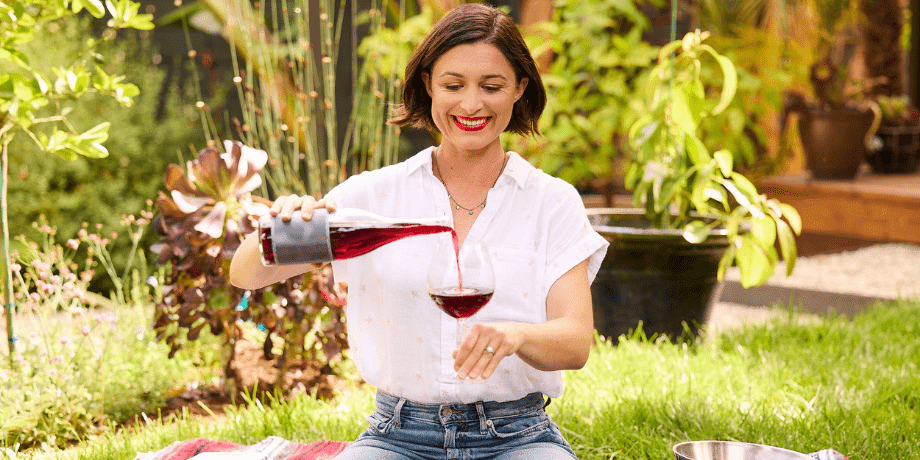“I alone cannot change the world, but I can cast a stone across the waters to create many ripples.” -Mother Teresa
It was early in my wine career when I assumed the role of Head Sommelier at K&L Wine Merchants in Redwood City, CA. I discovered that the awareness tools and skills I was cultivating through my yoga and mindfulness studies were helping me excel in blind tasting, and I was eager to learn more.
At first, I was fascinated by the practical application of mindfulness to support wine professionals in training attention and improving sense memory skills. There is an abundance of scientific research showing that mindfulness can enhance working memory and decrease mind-wandering, among other health benefits. What I didn’t expect was to uncover a far more important application for mindfulness in wine today – a tool to promote sustainable wine culture.
You see, as I explored the deeper connections between mindfulness and wine, I found that what made wine special to me was not the hierarchies of taste or metrics of style. The real value to me was in the people, place, and purpose behind the wine.
And that is what sustainability is all about.
Sustainability Today: An Evolving Concept
I thought I knew a lot about sustainability from my work as a retail wine buyer but I really had no idea how much I didn’t know until I studied with California Sustainable Winegrowing Alliance Executive Director, Allison Jordan, as part of the Sonoma State University’s Global Wine Executive MBA program.
Although this is just one of many organizations worldwide dedicated to advancing sustainability through education and outreach, the CSWA has been a leader in sustainability in wine for decades. Its California Code of Sustainable Winegrowing Workbook and comprehensive certification programs are industry benchmarks for climate action efforts. My time with Allison and the CSWA completely opened mind and broadened my perspective about sustainability. I highly recommend any person in the trade interested in developing more advanced sustainability protocols to familiarize themselves with this organization and its resources.
Today, most people both inside and outside the wine industry think of sustainability as it applies to the environment. However, while ecological factors are indeed very important to a sustainable agricultural program, the global wine industry is built upon a vast supply chain network involving many links from soil to glass.
This means that in the context of the wine industry at large, sustainability is really a broad and multi-faceted concept that includes social, political, geographic and economic impacts. And depending on your role and position in the supply chain – whether you are in grape growing, production, distribution and sales, or the end consumer, for example – your attitude about sustainability along with the choices available to you may differ wildly. What works for a small scale grower may not be sustainable on a large scale, and vice versa. There is no one-size-fits-all solution.
Mission, Model, and Mindset
Sustainability also has different conceptual dimensions to consider. It is at once a mission, a model, and a mindset, all of which are constantly evolving. In the very broadest of terms, the global wine industry’s sustainability mission is currently oriented around the goal of preserving the natural resources while engaging in socially responsible practices to ensure the industry can sustain itself for the future. Each year brings new knowledge, challenges and innovations, so the mission evolves with the times.
Meanwhile, the model aspect of sustainability refers to the organizational methods and actions that inform how the industry moves towards its mission. There are countless methods, systems and approaches, but the five pillars of sustainable development as outlined by the UN is a model I have found to be easy to relate to and apply as a working wine professional.
Neatly organized into five “P’s” – people, prosperity, planet, peace, and partnership – each “P” represents a different key stakeholder group. All are connected and impact one another in different ways. Whether you are a winery executive, grape grower, winemaker, retail store owner, sales professional or consumer, carefully considering each “P” can be a helpful way to make more sustainable decisions,in wine business or otherwise.
Thinking About Personal Sustainability
I also like the UN’s “Five P’s” approach because in addition to being easy to remember, it makes a nice roadmap for cultivating a sustainability mindset at the personal level.
For many people living and working in the day-to-day grind as wine trade professionals outside of farming and production, it can be difficult to feel connected to the sustainability movement or understand how your actions can have an impact. However, sustainability can be practiced at the individual level.
One way to do this is to evaluate each “P” as it might apply to our personal lives and work. With repetition, this form of a personal sustainability audit can spark dialogue and open space to consider different choices and actions around more sustainable intentions. Some of these choices might include a commitment to connect more deeply to others, promote healthier behaviors, engage more fully with nature, or advance a social causes in the local community. When it comes to sustainability, we are all in this together. The smallest shifts can lead to big changes.
Mindfulness as a Tool to Advance Sustainability, Connection and Change
Mindfulness is not a belief system or spiritual concept. It is the practice of being aware of one’s thoughts, feelings, and actions in the present moment, without judgment or distraction. It has been increasingly recognized as a valuable tool for promoting wellbeing, reducing stress, and enhancing cognitive and emotional skills. By adopting mindful and sustainable practices in viticulture and winemaking, wine producers can reduce their environmental impact, enhance their social and cultural connections, and improve economic prosperity.
Similarly, by making mindful and conscious choices to buy sustainable wines in the marketplace, consumers can support ethical and responsible production and consumption patterns while enjoying high quality wines in diverse styles that are in alignment with their needs and values.
As certified advanced sommelier, educator and wellness professional with a long career in the wine business, I have also witnessed firsthand how mindfulness can be used as a tool to transform consciousness while promoting sustainable and healthy living with wine. My intention to share this message with others is the inspiration behind the creation of my Mindful Wine™ classes and experiences, and the same intention inspires my work today.
When we allow ourselves to be present with shared experience and reminded of the interconnectedness between each other and nature (especially when facilitated through wine!) we open up possibilities to grow into more aware, intelligent and engaged wine professionals. We can become stewards shepherding the future of the industry and our planet with purpose, optimism and hope.
A Call to Action
To my fellow sommeliers, wine buyers, educators, writers, critics – all trade professionals who interact with and influence consumers and the culture of the industry through what we say, serve, and write:
We occupy a critical link in the chain as the gatekeepers of the consumer wine experience.
We can use our power to inspire change at the consumer level, or we can use it to cling to the status quo.
The work of advancing sustainability should not fall only on the shoulders of growers, winemakers, and the people working directly with the land. Nor should it fall in unfair proportion on consumers who have limited resources, knowledge and information.
If we care about sustaining our industry for future generations—and we should—then it is our duty to take greater responsibility and be more mindful in how how we exert our influence.
We might want to think about using our power differently in order to contribute to the sustainability imperative in a more action-oriented, positive and lasting way.
We might want to change how we evaluate wine and adopt a more holistic approach that is intentional, inclusive and oriented around a greater good.
In the words of Mother Teresa: together we can do great things.
Chiara Shannon is a sommelier, wine educator and consultant based in Los Angeles. You can find her on Instagram @theyogisommelier and online at www.mindfulwine.co.








